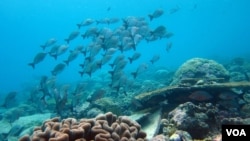Warming oceans will cause profound changes in the biodiversity of marine life, according to the largest study ever of marine species. Some species will expand into new regions, while others, especially in the tropics and reef areas, will likely die out.
An international research team used a model that looked at sea surface temperature changes and then compared that information with data on heat tolerance of individual species and habitat preference. The findings describe the distribution for nearly 13,000 species worldwide.
Tropics hardest hit
The tropics will be hardest hit with species extinction because they are less likely to adapt. “This is especially worrying and highly germane to Australia’s coral reefs,” said the report's co-author, Professor John Pandolfi of the ARC Centre of Excellence for Coral Reef Studies at Australia's University of Queensland. “Complementary studies have shown high levels of extinction risk in tropical biotas [local marine ecosystems] where localized human impacts as well as climate change have resulted in substantial degradation.”
Although other species will move about more easily, Pandolfi says that, too, has a down side. “Instead of having discrete differentiation of different marine communities in different places, we found in our analysis that projected climate change is going to result in a lot more mixing of species and a lot more sameness of diversity throughout the world’s oceans.”
Loss of biodiversity, loss of food
The study charts these changes out to the year 2100. That sameness in the ocean is especially problematic as new strategies are put into place to meet the food demands of a growing population.
“When one formally abundant species moves into a new ecosystem or geographic region they not be able to reproduce as effectively as they used to,” Pandolfi said. “It comes down to understanding the dynamism that is going to be imposed from climate change and being able to have the tools to manage for those dynamics.”
Unless global emissions are controlled, the planet and its oceans will continue to heat up, unleashing a series of impacts as predicted by the study. New combinations of resident and invader species will present unprecedented challenges for conservation planning.
“That’s something I think that it isn’t easy for people to get their heads around,” Pandolfi said. “Now if I’m going to set up a marine park, I want to make sure that organisms are preserved through decades or centuries. With climate change, those communities are going to be dynamic. They are not going to be static entities.”
In the warmer ocean, species will cross into new geographic areas beyond political boundaries. Pandolfi says the study, published in Nature Climate Change, underscores the importance of cooperation among nations to address climate change and the potential loss of biodiversity.




